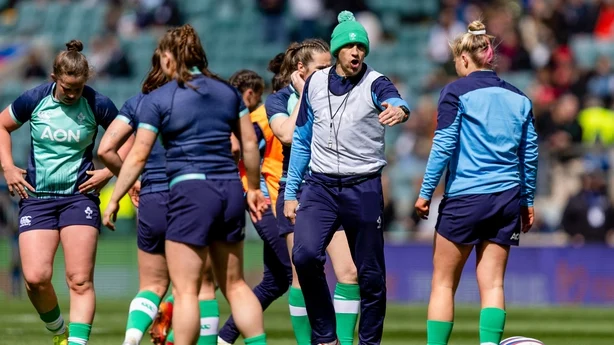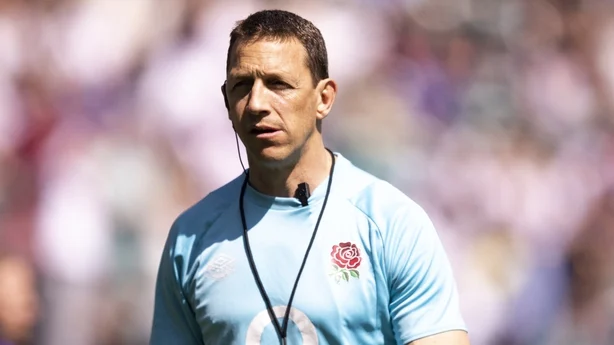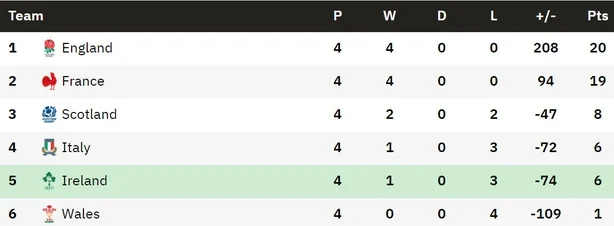Ireland head coach Scott Bemand doesn't believe the Guinness Women's Six Nations needs to be re-formatted, despite the gap between England and the rest appearing to be bigger than ever.
As expected, the Red Roses made light work of Ireland in front of just under 50,000 people at Twickenham last Saturday, their 88-10 win being just one point short of Ireland's record defeat, which also came against England back in 2002.
England will be heavy favourites to win away to France on Saturday and secure a fifth Grand Slam in a row, with John Mitchell's side scoring 228 and conceding just 20 points across four games so far in this championship.
Their continued dominance, combined with yet another one-sided win against Ireland, has seen some pundits question whether the Women's Six Nations is currently fit for purpose.
But Bemand, who spent eight seasons working as an assistant with England, believes changing the format of the championship would not be in their best interests.
"People and the media generally want quick fixes for things," he said.
"I think the fact that people are talking about it shows how much interest there is. Do I think it's a viable competition? Yes, I do."

As painful as Ireland's 78-point thrashing away to England was on Saturday, Bemand (above) says experiencing playing in front of nearly 50,000 people at Twickenham will do his players more good than harm in the long term.
"There’s investment going in, there’s focus being put on it. We said after the game last weekend, that arena and that atmosphere is something that our players have to learn.
"Now we’ve got that under our belt and come through, and we’re not derailed. We’ve reviewed it, we’ve parked it, we go forward.
"We like to think we can keep trying to bridge the gap. It’s great to see the teams outside England and France going hell for leather at each other and competing hard.
"Having been a part of it for a long time, the quality throughout is better. It’s our job to try and close that gap on those top two."
While England have traditionally been the market leader in this championship, the RFU's decision in 2018 to become the first Test nation to make their women's team fully professional has seen them leave the rest of the Six Nations in their wake.
An element of professionalism existed in the English game before that, with players given short-term contracts in the run-up to a World Cup.
With Wales, Scotland, Italy and Ireland - in 2022 - eventually following the RFU's lead, the gap has turned into a chasm between England, France and the rest.
And while the Ireland coach admits his side are a considerable distance away from John Mitchell's side, he says they have to learn some hard lessons.

"I was involved in the England programme when it started professionalism really.
"I remember my first dealings with the Six Nations. The girls were teaching, working as firefighters, they were out and having to come in from a place of work to do the Six Nations and then go back out.
"I remember sessions meeting Sarah Hunter at Bath University and we had some lights and we were trying to get a session with six or seven girls on a Monday evening. So, that started somewhere.
"That was six or seven years ago and things have quite quickly accelerated within that programme. So there will be some pieces that we can use that 'intel’, use what worked and what didn’t, and hopefully streamline and be more efficient about how quickly we can get there.
"How quickly that gap is bridged remains to be seen. We need to expose those young players to as many of the sort of competitive training and fixtures as we possibly can.
"I think the Celtic Challenge has grown massively from year one to year two. I'd anticipate year three looking completely different to this year, being another level up.
"There’s bits and pieces that we can put in place that can, not sure shortcut it, but avoid going around the houses looking for the answers. If we know where the north star is, we can get there in the most direct route possible," he added.
Ever the optimist, Bemand cited an example from his own country of how quickly the fortunes of a team can change.
"Long-term, there's a bit of pain now, absolutely, and that is being reviewed and reflected upon, but it probably can stand us in good stead.

"An example I used, and I apologise from an England group, but Jonny Wilkinson’s first tour with England, they lost 79-0 to Australia. In a couple of years, he was back there winning a World Cup.
"What our journey looks like after this [remains to be seen], but we know that we can learn and it has been evidenced before that people can learn from these environments and go on to get better and better."
As chastening as the Twickenham defeat was, it will soon be forgotten if Ireland cap off their tournament with a victory over Scotland on Saturday, which could see them finish as high as third in the table.
And Bemand believes his side have what it takes to finish in style in Belfast.
"After losing to Italy, we didn’t throw the baby out with the bath water. We could see that it was reachable. We could see the fixes we need to put in place.
"Of course the girls feel the losses, but if you can stay stable and consistent with things, you allow yourselves the opportunity, regardless of results, to almost park it and move on.
"I think the girls are focused on what they did and how it went, and now refocus and bounce back to what is going to make the biggest difference against Scotland. We built a bit of momentum over those three games.
"We can park that [defeat to England] as a blip and we can retain some of that confidence and momentum from against Wales, who are probably in that pool of teams that are fighting it out. We know we can produce a performance like that against Scotland again."
Disclaimer: The copyright of this article belongs to the original author. Reposting this article is solely for the purpose of information dissemination and does not constitute any investment advice. If there is any infringement, please contact us immediately. We will make corrections or deletions as necessary. Thank you.






